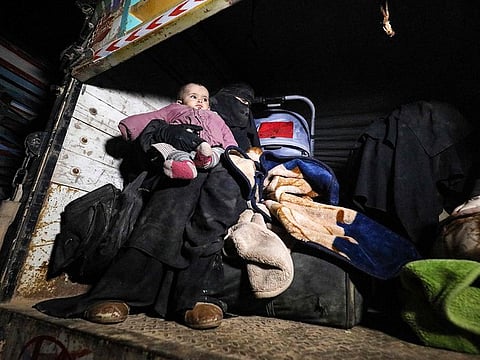Take back Daesh fighters, Trump tells Europe
Pending US pullout set off a countdown for governments to repatriate their citizens

Washington: European nations must take back hundreds of Daesh fighters captured in Syria, President Donald Trump said late Saturday, after a delay in announcing what he said would be the end of the so-called “caliphate.”
Trump shocked allies in December by declaring the pullout of roughly 2,000 US troops who had been assisting local forces in Syria against Daesh, whose sole remaining territory is half a square kilometer (one-fifth of a square mile) in eastern Syria.
The pending US pullout set off a countdown for governments whose citizens, having joined Daesh, were captured by the US-backed, Kurdish-led Syrian Democratic Forces (SDF).
“The United States is asking Britain, France, Germany and other European allies to take back over 800 Daesh fighters that we captured in Syria and put them on trial,” Trump said in a tweet.
“The Caliphate is ready to fall. The alternative is not a good one in that we will be forced to release them. The US does not want to watch as these Daesh fighters permeate Europe, which is where they are expected to go.”
In light of developments in the military situation in northeastern Syria and American decisions, and in order to ensure the security of French people, we are exploring all options in order to prevent these potentially dangerous individuals from escaping or dispersing.France’s Ministry for Europe and Foreign Affairs
Once the US-led coalition declares it has taken all Daesh territories, the White House is expected to withdraw American troops.
When that happens, the risk is high that “foreign terrorist fighters” will escape SDF control, posing a new threat.
For about two weeks, the Trump administration has been pushing its allies to take their citizens home, and the US said it was ready to help in the repatriation, but time has been running out.
Several countries, including France, that have chosen to leave the militants in SDF detention now confront a diplomatic, legal, political and logistical puzzle.
“We do so much, and spend so much - Time for others to step up and do the job that they are so capable of doing. We are pulling back after 100 per cent Caliphate victory!” Trump said in his late-Saturday tweets.
On Friday he said announcements on the fall of the so-called caliphate would be made “over the next 24 hours,” but that deadline came and went.
An SDF commander said his US-backed forces slowed their advance to protect civilians.
The militants declared a so-called “caliphate” in large parts of Syria and neighboring Iraq in 2014, but have since lost all but a tiny patch of territory near the Iraqi border.
Trump’s Syria pullout has highlighted the deep trans-Atlantic rift that emerged under his presidency, and the differing views of the two sides were on display Saturday at a security conference in Munich.
A French government source criticised the Trump administration’s approach as “we’re leaving, you’re staying” and added: “They’re trying to manage the consequences of a hasty decision and making us carry the responsibility.”
About the detainees
About 850 men and several thousand women and children from nearly 50 countries are being held in northern Syria in detention camps for Daesh fighters and sympathisers.
They have been locked up indefinitely, in ad hoc wartime prisons and refugee camps, by the Kurdish-led Syrian Democratic Forces, which is allied with the United States.
Most of those detainees’ home countries have been looking the other way, despite the Kurds’ pleas to relieve them of that burden.
The prospect of repatriating citizens who had joined Daesh, and of trying to prosecute or reintegrate them into society, has raised daunting concerns for many allied governments over security, legal and political risks.
Not one detainee from the makeshift Syrian camps was returned to their home nation in the last five months of 2018.
But in January, Kazakhstan announced that it had repatriated about 46 of the detainees, including about 41 women and children.
Four American officials said Oman and Tunisia also took back some of their citizens from the Kurds.
A Tunisian official denied that his government had agreed to repatriate any Daesh fighters or their families.
But several other officials said up to nine people among what was described as a large number of Tunisian detainees have been returned.
At a news conference last week in Washington, Adel Al Jubeir, a senior Saudi official, said his government was willing to repatriate some 50 Saudi men held in the Kurdish camps.
Several European countries that had previously refused to deal with their detained citizens are now considering repatriating some of them.
Among those countries is Kosovo.
Additionally, reports last month indicated that France is close to deciding whether to bring back about 130 of its detained citizens, including men, women and children.
Other European countries with large numbers of detained citizens, including Germany and Belgium, are said to be closely watching how Paris will decide, with an eye toward echoing it.
In a statement to The New York Times, France’s Ministry for Europe and Foreign Affairs made clear that the withdrawal of US forces from Syria had forced it to deal with the detainees.
“In light of developments in the military situation in northeastern Syria and American decisions, and in order to ensure the security of French people, we are exploring all options in order to prevent these potentially dangerous individuals from escaping or dispersing,” the statement said.



